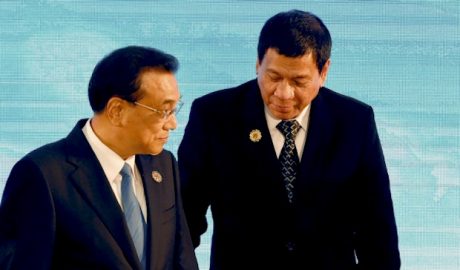
Senator Leila de Lima was on a rampage following Philippine President Rodrigo Duterte’s reported shift of the country’s foreign policy to one that involves a cosying up to China and a “separation” from the United States. De Lima described Duterte’s move during his official visit to China this week as a “whole level of betrayal”.
Mocking Duterte as “star-struck and starry-eyed,” De Lima asked if Filipinos “can expect more” from relations with two countries whose people, she said, “have limited expectations about respect for their human rights, labor law protections and, in general, freedom from violence from their own government.”She also called him a “naïve child looking at the world through distorted lenses when it comes to a lot of things, including foreign policy,” with “a really inflated, if not delusional, view of himself as a strongman at the level of China and Russia’s leadership.”“But that’s what you get from violently and vengefully silencing the voices that try show you reason – you deny yourself the chance to mature,” she added.
It is a bit ironic, however, the way de Lima describes the thinking Duterte applies to his government’s approach to China as one that looks at the world “through distorted lenses”.
If there is a distorted lens through which things transpiring today are being seen, it is the Cold War lens that Filipinos’ eyes remain stuck behind. Whereas in the old days, the bad guys were the “communist countries” and the good guys were the “capitalist countries”, today under the fresh light of better information and evolved ideologies, it is no longer that clear cut.
For one thing, a “communist” country like China is not really as communist as it used to be. Its brand of capitalism is now giving the capitalist orthodoxy of the West (that half of the world that the US presumes to lead) a run for the money. China is now the world’s second biggest economy and its manufacturing centre. It got to that position by evolving into a hybrid state that now defies the old lines that divided the planet during the Cold War.
Yet, the rhetoric used by those who are critical of Duterte remain consistent with the narrative of that old global order. De Lima’s sidekick in the Philippine Senate, Senator Antonio Trillanes IV, for example, called Duterte a communist — as if that was necessarily a bad thing in the context of what is happening today. Again, he uses the notion of being “communist” with derision presumably in reference to the seemingly crystallising “Philippine pivot to China” thing. As mentioned earlier, the question of whether China remains “communist” in the real sense is becoming increasingly debatable.
Interestingly enough, it is really Trillanes — a convicted mutineer who sought to violently overthrow the government of former President Gloria Arroyo — who holds a track record for behaving like the stereotypical communist. Indeed, the recent protest rally in front of the US Embassy today that turned violent was instigated by the same old Filipino communist groups. These groups, while supposedly ideologically-linked to Maoist doctrine, are no more than faded relics of the so-called “communism” (if it can still be called that) practiced by China in the past.
Nonetheless, many Filipinos have been thrown into a shrieky panic over this supposed pivot away from the “old ally” towards China — and, perhaps, Russia. These are, after all, people who were brought up on Mickey Mouse cartoons, are convinced that basketball is their game, and remain America’s biggest fans in the Far East. More importantly, the Philippines, by all intents and purposes, is a country built and sustained on US aid and US capital.
So it is really not surprising that Filipinos now find themselves kicking and screaming on the perception that they are being violently dragged out of the comfy cocoon of US influence and protection. Perhaps Filipinos are just too hard-wired to not fathom the possibility that Duterte’s pivot to China marks the beginning of the Philippines’ coming back home to Asia.
[Photo courtesy Australian Financial Review.]

No comments:
Post a Comment